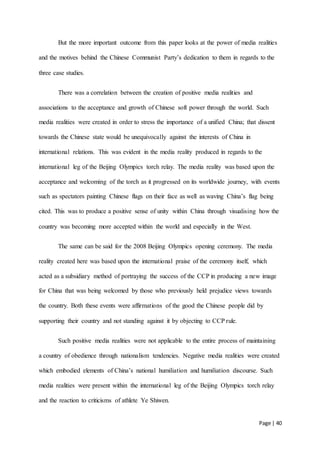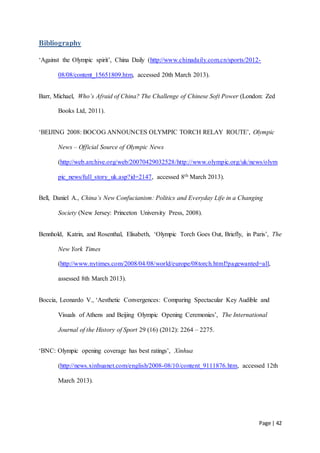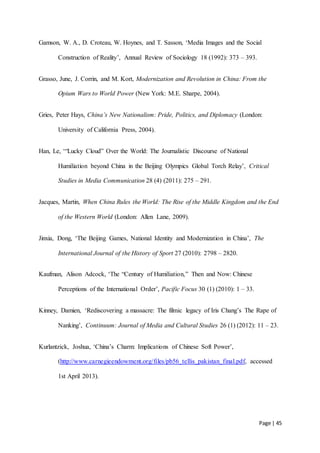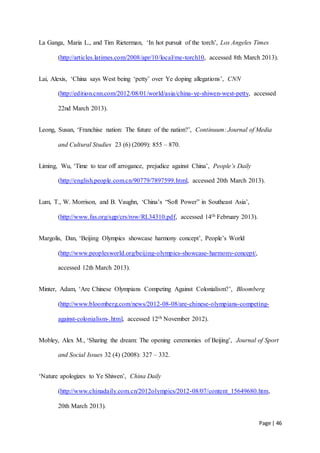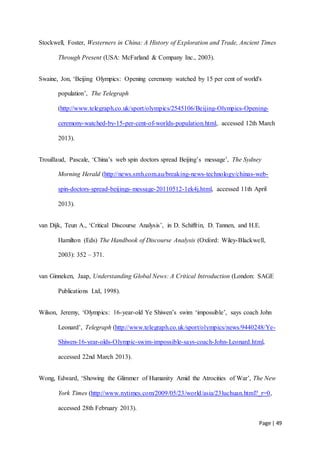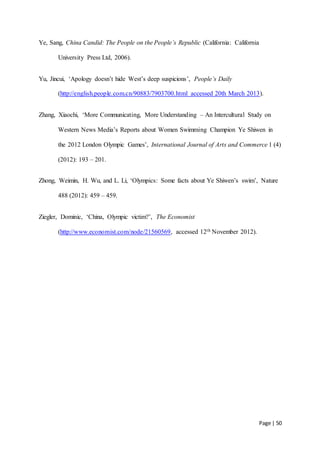This document provides an analysis of China's attitudes towards the 2008 and 2012 Olympic Games through the lens of Chinese soft power and humiliation discourse. It examines China's approach to the 2008 Beijing Olympics torch relay and opening ceremony, as well as the criticism of Chinese swimmer Ye Shiwen's performance at the 2012 London Olympics. The document uses these case studies to explore how China drew upon concepts of soft power and humiliation to shape its relationship with the Olympics and further its goals of promoting nationalism and national unity.
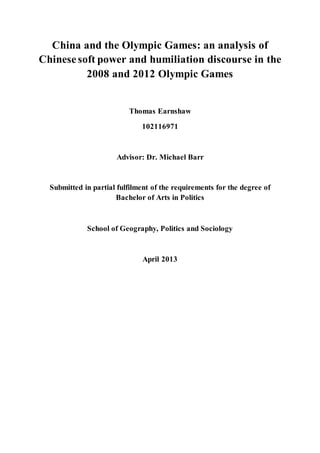

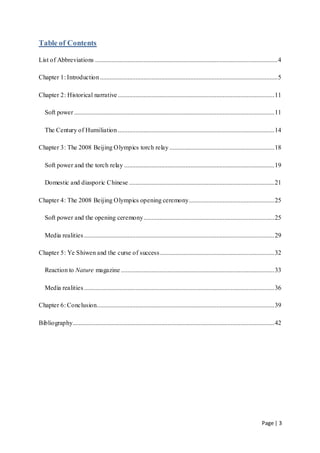
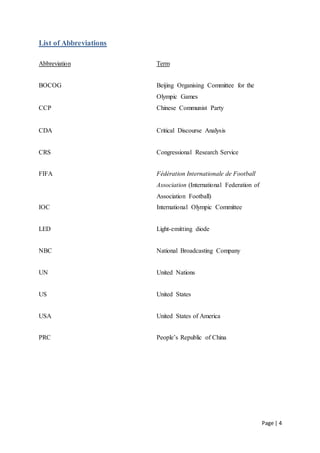

![Page | 6
of the “glories of China’s 5,000 years of civilisation, presenting achievements ranging from
classical calligraphy to Confucian harmony, and Peking opera to China’s great four
inventions: paper, printing, gunpowder, and the magnetic compass”.4 Furthermore Callahan
gives prominence to the opening ceremony’s tribute to Ming dynasty Admiral Zheng He,
who made seven voyages to destinations in the South China Sea, the Indian Ocean, the
Persian Gulf, and the Red Sea. The voyages had an intrinsic message of peace to them which
was reflected in the names of ships such as “Pure Harmony”, “Lasting Tranquillity”, and
“Kind Repose”.5 Callahan believes there to be reasoning related to peace and harmony behind
the inclusion of Zheng in the show, as “open doors lead to prosperity, and the inner harmony
of Confucian values leads to the external peace of mutually beneficial foreign relations; now
that China is once again open and harmonious, nothing can stop its “peaceful rise””.6
Callahan’s analysis of the Beijing Olympics opening ceremony links the event to
China’s experiences of national humiliation at the hands of Western imperialism, which is
described in the literature as the Century of Humiliation. The Century of Humiliation is
recognised to a period of time ranging from the beginning of the First Opium War in 1839 to
the Chinese Communist Party’s (CCP) victory in the Chinese civil war and subsequent
establishment of the PRC in 1949. This period in China’s history saw its effective territorial
control shrink by a third, its millennia-old imperial system collapse, and the country
subjugated to internal uprisings, invasion by imperial powers, and civil war.7
Callahan describes the Century of Humiliation as China’s tale of going from “being at
the center of the world to being the Sick Man of Asia after the Opium War (1840), only to
rise again with the Communist Revolution (1949) [sic]”, and that the attachment to this
4 William A. Callahan, China:The Pessoptimist Nation (New York: Oxford University Press, 2010): 2.
5 Foster Stockwell, Westerners in China:A History of Exploration and Trade, Ancient Times Through Present
(USA: McFarland & Company Inc., 2003): 30.
6 Callahan, China, 3.
7 Alison Adcock Kaufman, ‘The “Century of Humiliation,” Then and Now: Chinese Perceptions of the
International Order’, Pacific Focus 30 (1) (2010): 2.](https://image.slidesharecdn.com/5b380b87-b62e-4e33-8ba6-171069ffc766-161103211257/85/Dissertation-Final-Draft-6-320.jpg)
![Page | 7
period in China’s history arrives from “not just…celebrating the glories of Chinese
civilization” but also a desire to “commemorate China’s weakness”.8 Humiliation discourse
is, as Kaufman writes, “narrative [that] may be used to strengthen popular anti-foreign
sentiment and to justify belligerent actions on the international stage, all in the name of
“never forgetting” the shame of the past”.9
Regarding the Beijing Olympics as a whole, Callahan notes historian Xu Guoqi’s
words on the political significance that accompanied the event and how it links to humiliation
discourse. Xu writes:
“For both Chinese and Westerns, the Beijing Olympics present a great
opportunity to carry out their respective political goals. While it is clear that
Beijing wants to use the Games to convey its best face to the world, it is not
surprising that many external groups or organisations would like to use the
Games to shame and humiliate China to achieve their own political
agendas.”10
Such discourse from scholars presents the Century of Humiliation as relevant to fulfilling
China’s desires and goals with events such as the Olympic Games being perfect opportunities
to do so.
Alongside links to humiliation discourse Callahan recognises how the Olympic
Games are a method through which China can continue to expand upon its soft power
credentials. The father of soft power theory, Joseph Nye, describes soft power as the ability to
co-opt rather than coerce; “A country may obtain the outcomes it wants in world politics
because other countries – admiring its values, emulating its example, aspiring to its level of
prosperity and openness – want to follow it”.11 The ability to establish soft power effectively
“tends to be associated with intangible assets such as an attractive personality, culture,
political values and institutions, and policies that are seen as legitimate or having moral
8 William A Callahan, ‘National Insecurities: Humiliation, Salvation, and Chinese Nationalism’, Alternatives 29
(2004): 202.
9 Kaufman, ‘The “Century of Humiliation”’, 3.
10 Callahan, China, 10.
11 Joseph S. Nye, Soft Power: The Means to Success in World Politics (United States: PublicAffairs. 2004): 5.](https://image.slidesharecdn.com/5b380b87-b62e-4e33-8ba6-171069ffc766-161103211257/85/Dissertation-Final-Draft-7-320.jpg)
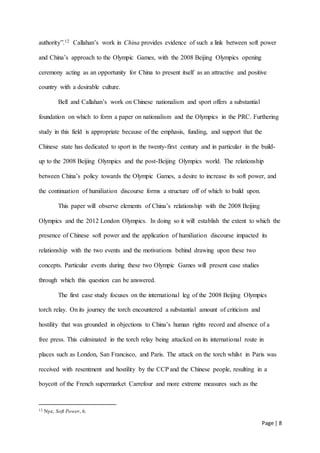
![Page | 9
defacing of the French national flag with swastikas.13 Zeigler noted that “Many Chinese saw
this as a concerted campaign to spoil China’s hosting of the games, a moment of great nation
pride”.14 Emphasis on the importance and relevant of national pride and the offence caused
by not violating this was an example of how drawing upon humiliation discourse was a
natural reaction from China in regards to Western criticisms of the nation. This provides a
base off of which to expand and explore the relationship between humiliation discourse and
the international leg of the 2008 Beijing Olympics torch relay in China.
The second case study focuses upon the 2008 Beijing Olympics opening ceremony.
Academic work from the likes of Callahan links the event to both soft power and humiliation
discourse. Callahan makes note of Jing Zhang’s description of the opening ceremony of the
Beijing Games. Zhang describes it as a show to present to the world “the rich and beautiful
history of [Chinese] culture”; how the opening ceremony was an opportunity for China to
expand upon its soft power credentials through promoting its cultural positives to the world.15
This paper will approach the Beijing Olympics opening ceremony in a similar approach
whereby the relationship between soft power and the event in question will be explored.
The third event will shift the focus on to the 2012 London Olympics and swimmer Ye
Shiwen. Ye Shiwen’s gold medal victories would have been moments for China to celebrate
and treasure yet these celebrations with cut short by doubt placed upon her performance in
the 400m individual medley by crowds from the West, who disputed the legitimacy of her
victory instead suggesting that she may have been using performance enhancing drugs. This
was a moment of national humiliation for China as Ye was an extension and representative of
the Chinese state, therefore making attacks on her as attacks on China. The state-owned
13 Reuters, ‘Protestors hold a French national flag during a demonstration against Carrefour supermarkets and
French goods on a street in Wuhan, Hubei province April 19, 2008. Chinese official media have sought to
temper nationalist calls to boycott foreign businesses accused ofbacking Tibetan independence,urging angry
citizens to focus on economic development’, Reuters
(http://www.reuters.com/news/pictures/searchpopup?picId=3943345, accessed 12/11/12).
14 Ziegler, ‘China, Olympic victim?’
15 Callahan, China: The Pessoptimist Nation,6.](https://image.slidesharecdn.com/5b380b87-b62e-4e33-8ba6-171069ffc766-161103211257/85/Dissertation-Final-Draft-9-320.jpg)
![Page | 10
newspaper Global Times attacked those who disputed Ye’s victory, stating that “it shows that
the unfriendliness of the west to China is spreading”, whilst China’s state-controlled news
agency Xinhua wrote that “[the West] cannot accept China’s rise. That’s why they criticize
Chinese athletes”. 16 This provides a basis on which to explore the criticisms and doubts of
Ye Shiwen’s performance in the 400m individual medley and whether attitudes related to
humiliation discourse existed, and if so, why such attitudes existed.
I plan to approach these case studies in two ways, the first being through critical
discourse analysis (CDA). According to van Dijk CDA is a “type of discourse analytical
research that primarily studies the way social power abuse, dominance, and inequality are
enacted, reproduced, and resisted by text and talk in the social and political context.”17 This
approach will be used when analysing documents from the Chinese state, state officials, and
state-controlled media outlets that address either of the three cases studies. This approach will
assess how such discourse produced media realities within China and the purpose behind the
creation of such media realities in the hope of understanding the attitudes and motives of the
CCP in relation to the 2008 and 2012 Olympic Games.
The second approach is theoretical in that it is literature-based research. Literature-
based research acts as a foundation through which relevant literature and other documents
being analysed through CDA can be cross-referenced and evaluated. This process
incorporates the collection of literature relevant to the three case studies and from this,
analysing and evaluating their relevance to the over purpose of this paper.
16 Tania Branigan, ‘London 2012: Ye Shewin reaction ‘shows western hostility to China’, The Guardian
(http://www.guardian.co.uk/sport/2012/aug/01/ye-shiwen-western-hostility-china, accessed 08/11/12); Adam
Minter, ‘Are Chinese Olympians Competing Against Colonialism?’, Bloomberg
(http://www.bloomberg.com/news/2012-08-08/are-chinese-olympians-competing-against-colonialism-.html,
accessed 12/11/12).
17 Teun A. van Dijk, ‘Critical Discourse Analysis’, in Deborah Schiffrin, Deborah Tannen, and Heidi E.
Hamilton (Eds) The Handbook of Discourse Analysis (Oxford: Wiley-Blackwell, 2003): 352.](https://image.slidesharecdn.com/5b380b87-b62e-4e33-8ba6-171069ffc766-161103211257/85/Dissertation-Final-Draft-10-320.jpg)
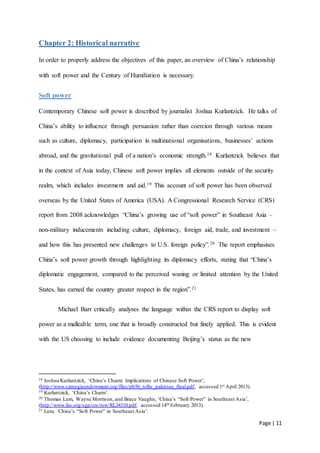


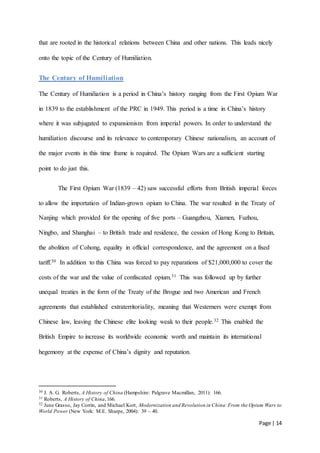


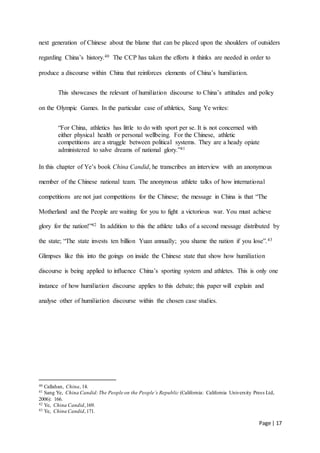
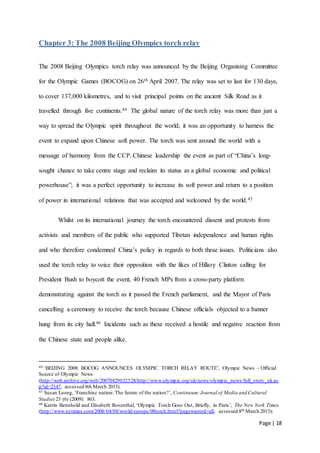

![Page | 20
“Under the authorization of the International Olympic Committee, the Beijing
Olympic torch relay is taking its journey of harmony throughout the world,
sharing the passion and glory of the Olympics with the world, and has
received warm welcome from the people en route [sic].”48
By citing the authorisation received from the IOC, the explicit use of the message of a
Journey of Harmony, and the positive reception the torch relay received, the People’s Daily
labelled the torch relay as a success of China’s newfound internationalism and expanding soft
power. The article goes on to mention the praise China gained for its engineering of the torch
relay, with examples of many onlookers waving Chinese flags or putting flag stickers on their
face to cheer on the event in spite of the anti-Chinese being used.49 By referring to the
acceptance that the torch relay received during its international legs the desire and success
that China had to increase its global position and admiration was reiterated. The same article
quotes Olympic champion and politician Guy Drut as saying “The Olympic sacred fire is a
symbol of peace, tolerance…and should not be affected by anybody in any way”.50 By
linking of the Olympic message with its own, those who were hostile towards the torch relay
were portrayed in a negative light as attacks on the torch were attacks on Olympism as well
as China.
This message of positivity was seen in further People’s Daily dialogue. The
newspaper gave focus to pro-China messages from foreign government officials and
politicians. Regarding the attacks on the torch during its Western leg the newspaper quoted
former leader of the Australian Liberal Party, Shane Stone, as saying that viewing China
through a Western prism is a mistake.51 A reality was established that represented the
growing respect that foreigners have for China’s culture and in turn how soft power efforts
48 ‘Olympic torch relay in Paris concludes’, People’s Daily
(http://english.people.com.cn/90001/90779/90867/6388235.html, accessed 7th March 2013).
49 ‘Olympic torch relay in Paris concludes’.
50 ‘Olympic torch relay in Paris concludes’.
51 ‘Shane: Boycotts, disrupting Olympic torch relay counterproductive’, People’s Daily
(http://english.people.com.cn/90001/90776/90883/6391248.html, accessed 7th March 2013).](https://image.slidesharecdn.com/5b380b87-b62e-4e33-8ba6-171069ffc766-161103211257/85/Dissertation-Final-Draft-20-320.jpg)
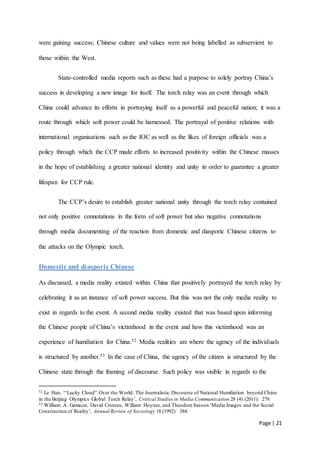
![Page | 22
torch relay. The state media focused upon the negative reaction of Chinese netizens – citizens
with digitally based community links – where disgust at foreign attacks and criticisms was
highlighted. The People’s Daily quoted an individual posting on the bulletin board system of
the Powerapple website who commented in reaction to the boycott of the French supermarket
Carrefour:
“What can we do? A French handbag or China’s dignity? French cosmetics or
China’s reputation? At this time, as a Chinese person, how should you
choose…Allow them to split up our country and insult our people?”54
Here the CCP’s success in structuring the agency of ordinary people was visible. By
focusing such a reality the Chinese state represented a system of structure and agency in
which it portrayed attitudes towards the torch relay to be derived from humiliation discourse
in the form of the “us” vs. “them” distinction, and in turn hoped to use such a reality to
increase its influence upon more of the Chinese citizenry.
An ordinary citizen named Sanny Zhao wrote that “The Chinese nation has never
been so united. On May 1st, let’s empty all the Carrefours in China! [sic]” showing the
success in the state’s desire to establish a great national identity through creating media
realities for ordinary people shape their logic from.55
In regards to China’s diasporic population, an historical account of attitudes towards it
is needed. Historically China’s attitudes towards its diaspora have been negative because of
the perceived threat they held against the nation. In contemporary China attitudes have
flipped. The state now regards its overseas population as a necessary and advantageous asset
54 ‘Chinese netizen discussion of“boycott on French goods”’, People’s Daily
(http://english.people.com.cn/90001/90780/91342/6392966.html, accessed 6th March 2013).
55 ‘Chinese netizen discussion of“boycott on French goods’.](https://image.slidesharecdn.com/5b380b87-b62e-4e33-8ba6-171069ffc766-161103211257/85/Dissertation-Final-Draft-22-320.jpg)



![Page | 26
unfavourable”.60 This policy feature was established in the aftermath of the failed 1993 bid
for the 2000 Olympic Games where members of the Chinese Olympic Committee, the Mayor
of Beijing and the Chinese government began a campaign to emphasise the ‘Beijing
Advantages Yet to be Recognised’ by Western culture.61 The visibility of this in the 2008
Beijing Olympics opening ceremony represented Chinese soft power in action as it was a
show that broadcasted China’s historical achievements and modern day advantages to the
entire world. The CCP’s efforts to link Orientalism, the West, and soft power highlighted the
desire to increase China’s soft power through removing the shackles of national humiliation
and thus increase China’s influence within the world, as well as global respect for China.
The creation of new image requires a change in attitude from both yourself towards
others and others towards you. China’s desire to construct a new image was rooted in
motivations to improve its image and desirability which if fundamentally rooted in liberation
from past humiliation. In order to achieve this desire a need to export more harmonious
attitudes from China was pivotal, which provides reason for why the concept of harmony was
central to the message of the Beijing Games. This was a desire held by more than just the
Chinese state. The People’s World quoted Juan Zyi, an undergraduate student at New York
City College, as saying:
“I’m proud when watching the opening ceremony. People’ don’t understand
China’s history or how we are now. I think this will show people that we are a
powerful country, but also that no one has to fear China [because we are also]
a friendly country.”62
The global nature of the opening ceremony meant that it was an ideal occasion
through which to act upon these soft power desires. It was an event for China to focus on
60 Chen et al., ‘The 2008 Beijing Olympics opening ceremony’, 189.
61 Sandra Collins, ‘Mediated Modernities and Mythologies in the Opening Ceremonies of 1964 Tokyo, 1988
Seoul and 2008 Beijing Olympic Games’, The International Journal of the History of Sport 29 (16) (2012):
2254.
62 Dan Margolis, ‘Beijing Olympics showcase harmony concept’, People’s World
(http://www.peoplesworld.org/beijing-olympics-showcase-harmony-concept/, accessed 12th March 2013).](https://image.slidesharecdn.com/5b380b87-b62e-4e33-8ba6-171069ffc766-161103211257/85/Dissertation-Final-Draft-26-320.jpg)
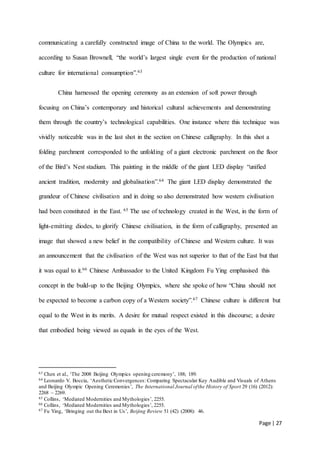
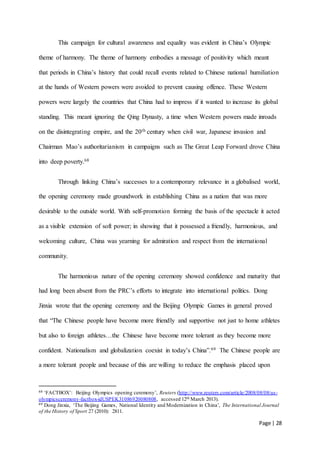
![Page | 29
humiliation discourse in the realm of international relations. The opening ceremony made
inroads in helping to transform China into a business that the international community found
was worth investing in.
Media realities
The use of soft power in the opening ceremony was embedded within society through the
state media and state-friendly media. Media realities were produced that corresponded with
China’s Olympic message of harmony but that focused on what the show implied about
China’s future. Newspapers such as Xinhua and China Daily produced a high quantity of
material in the aftermath to the opening ceremony, some of which contained accounts and
quotations from foreign officials praising the show and what they believed it meant for the
future of China.
An article from Xinhua dated 8th August 2008 reported on the opening ceremony,
describing it as an example of China welcoming the world and the outside world praising
China for its societal evolution and this policy of inclusiveness. It quoted the San Jose
Mercury News as saying “For decades China walled itself off, but this month it has invited in
the world. These Games…are designed to introduce China as a world superpower was its
greeting card”.70 It further quoted the American newspaper as saying “In the ensuing 15 years
[since it lost the 1993 bid for the 2000 Games], the ancient culture has fast-forwarded,
condensing the 20th century into a few years and plunging headfirst into the 21st”.71 Articles
from Xinhua dated 9th August 2008 and China Daily dated 10th August 2008 presented a
broad overview of the positive coverage and reception of the opening ceremony from inside
some of the most respected and powerful nations in the world. Both accounted for the same
New York Times article which wrote:
70 ‘Paper: China welcomes the world with Olympics’, Xinhua (http://news.xinhuanet.com/english/2008-
08/09/content_9079664.htm, accessed 12th March 2013).
71 ‘Paper: China welcomes the world with Olympics’.](https://image.slidesharecdn.com/5b380b87-b62e-4e33-8ba6-171069ffc766-161103211257/85/Dissertation-Final-Draft-29-320.jpg)
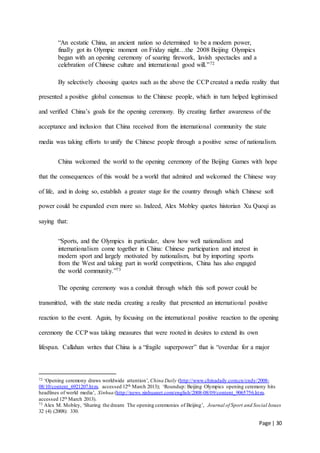

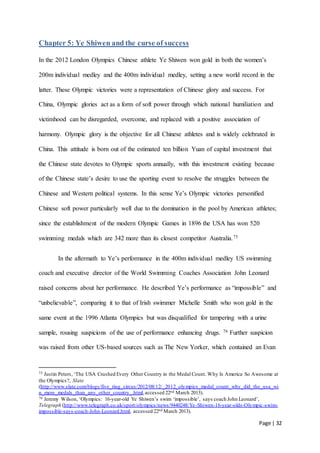
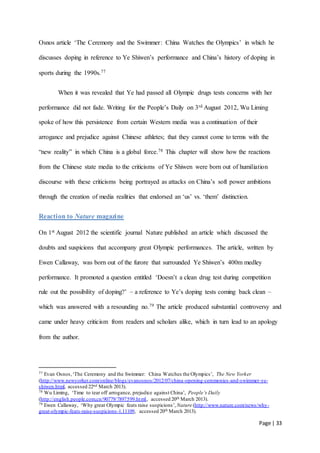
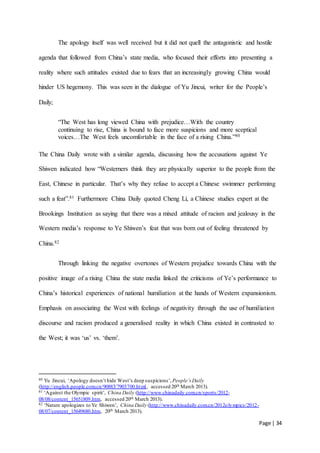
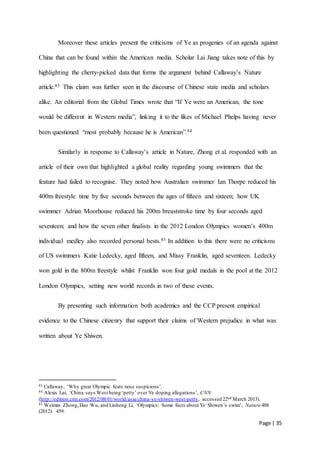

![Page | 37
At first glance this may be the reality we are presented with, but contemporary
literature presents an alternative reality. In recent years reports have been published that
question the legitimacy of such online comments. In many instances, instead of these
comments coming from ordinary citizens they are manufactured by the CCP to act as a
further extension of its discourse. The people behind these comments are technically ordinary
citizens, but they belong to the 50 Cent Party model. They are private citizens paid by the
CCP to pretend to be ordinary netizens when in fact they act as an additional mouthpiece for
the CCP line.87 Independent Chinese blogger Li Ming describes how the policy impacts Sina
Weibo users in particular:
“On the main hot topics, three days into the debate, only the propaganda
remains online [creating a] false general opinion. That is the major success of
Chinese propaganda.”88
Therefore doubt over the extent to which citizens have taken on board the CCP line
should exist. Moreover it provides additional evidence of the extent to which the CCP used
whatever power it had to structure the agency and debate in regards to the criticisms of Ye
Shiwen.
In order to strengthen its message the CCP focused its efforts on link humiliation
discourse to hostility between China and the West in order to draw upon fundamental
characteristics of ethnocentrism. Van Ginneken quotes Sumner on the concept:
“Ethnocentrism is the technical name for this view of things in which one’s
own group is the center of everything, and all others are scaled and rated with
reference to it…Each group nourishes its own pride and vanity, boasts itself
superior, exalts its own divinities, and looks with contempt on outsiders. Each
87 Sarah Cook, ‘China’s growing army of paid internet commentators’, Freedom House
(http://blog.freedomhouse.org/weblog/2011/10/chinas-growing-army-of-paid-internet-commentators.html,
accessed 11th April 2013).
88 Pascale Trouillaud, ‘China’s web spin doctors spread Beijing’s message’, The Sydney Morning Herald
(http://news.smh.com.au/breaking-news-technology/chinas-web-spin-doctors-spread-beijings-message-
20110512-1ek4j.html, accessed 11th April 2013).](https://image.slidesharecdn.com/5b380b87-b62e-4e33-8ba6-171069ffc766-161103211257/85/Dissertation-Final-Draft-37-320.jpg)


